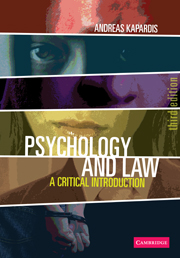Book contents
- Frontmatter
- Contents
- List of case studies
- Acknowledgements
- Foreword
- 1 Psycholegal Research: An Introduction
- 2 Eyewitnesses: Key Issues and Event Characteristics
- 3 Eyewitnesses: The Perpetrator and Interviewing
- 4 Children as Witnesses
- 5 The Jury
- 6 Sentencing as a Human Process, Victims, and Restorative Justice
- 7 The Psychologists as Expert Witnesses
- 8 Detecting Deception
- 9 Witness Recognition Procedures
- 10 Psychology and the Police
- 11 Conclusions
- Notes
- References
- Index
Foreword
- Frontmatter
- Contents
- List of case studies
- Acknowledgements
- Foreword
- 1 Psycholegal Research: An Introduction
- 2 Eyewitnesses: Key Issues and Event Characteristics
- 3 Eyewitnesses: The Perpetrator and Interviewing
- 4 Children as Witnesses
- 5 The Jury
- 6 Sentencing as a Human Process, Victims, and Restorative Justice
- 7 The Psychologists as Expert Witnesses
- 8 Detecting Deception
- 9 Witness Recognition Procedures
- 10 Psychology and the Police
- 11 Conclusions
- Notes
- References
- Index
Summary
It is a great pleasure to welcome this third edition of Andreas Kapardis' textbook, Psychology and Law. The first and second editions rapidly became recognised as classic texts and have been widely used in undergraduate and postgraduate courses on legal and forensic psychology. My own students have found the previous editions incredibly useful and informative. They have also been of great interest to forensic psychologists and psychiatrists, academic and practising lawyers, law-enforcement personnel, and many practitioners and policy-makers.
This third edition is even better. Although it follows the successful organisation of the second edition, this edition has been completely revised and updated. Professor Kapardis has obviously put a huge amount of work into reading all the latest studies and clearly demonstrates his encyclopaedic knowledge of psychology and law. Useful features include margin notes, case studies and revision questions. Like the previous editions, this book is scholarly, detailed, wide-ranging and up-to-date, but nevertheless very readable. There is no comparable modern textbook with such an international coverage of research on psychology and law.
This international coverage, focusing on the UK, the USA, Canada, Australia and New Zealand, reflects the fact that Andreas Kapardis is a very international person. He completed Masters and PhD theses under my supervision at Cambridge University about 25 years ago and then taught and carried out research for a long time in Australia. Now he is pioneering research and teaching in legal and forensic psychology in Cyprus.
- Type
- Chapter
- Information
- Psychology and LawA Critical Introduction, pp. xiii - xivPublisher: Cambridge University PressPrint publication year: 2009

